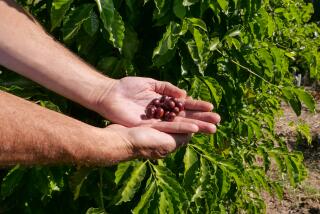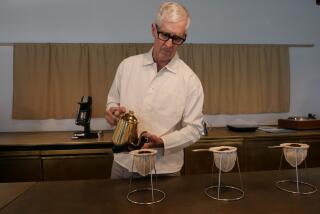Market Focus : Is Blue Mountain Still Worth a Hill of Beans? : Jamaica’s rare coffee percolates to the top of the price heap while connoisseurs pore over its merits and flaws.
- Share via
KINGSTON, Jamaica — The Cubans say they produce the world’s best cigars, the Russians the best caviar and the French the best wine. Here, the claim is for the world’s best coffee, Jamaican Blue Mountain.
“An understated masterpiece,” wrote one expert, “a quintessentially classic coffee with enough of everything; rich flavor and aroma, full body and moderate acidity in perfect, subtle balance.”
Another connoisseur, secret agent James Bond, once uttered over a fictional Jamaican breakfast: “Blue Mountain coffee. The most delicious in the world.”
There are dissenters. Even as the Dominican Republic challenges Cuba’s cigar claims, the Iranians the Russians’ caviar and Napa Valley the French wine, Hawaii coffee growers argue primacy for their Kona bean and Ethiopians on behalf of Yirgacheffe.
But if Blue Mountain is disputed as the best, there appears no question that it is the most expensive. The Specialty Coffee Assn. of America estimates the average cost of Jamaican Blue Mountain in the United States at $35 a pound, with some shops in cities such as Miami charging close to $50.
In reality, these are almost hypothetical prices, because finding genuine and unadulterated Jamaican Blue Mountain coffee is nearly as difficult as finding a snowball in the Everglades.
But supply is no guarantee of a reasonable price. In Japan, which buys about 85% of all the precious coffee, an upscale restaurant sells a dainty cup of Jamaican Blue Mountain for the equivalent of $15.
Is it that good? Is it the best?
“What makes it pricey is rarity, not quality,” said Ted R. Lingle, executive director of the Specialty Coffee Assn.
Yet in a phone conversation, Lingle spoke longingly of Blue Mountain as having “no equal” with a “well-defined aroma and distinct profile,” and he finally concluded that “well, yes, it is worth the price.”
Another American expert, Kenneth Davids, author of the highly regarded book “Coffee. A Guide to Buying, Brewing and Enjoying,” wrote in his latest edition that Blue Mountain “is, or was, a balanced, classic coffee with rich flavor, full body, and a smooth yet vibrant acidity.”
But even so, Davids wrote, superb or not, Blue Mountain coffee “appears to represent another minor chapter in the long history of vanity, snobbery and the sacrifice of substance to pretense.”
Davids said in an interview that “I have lost interest in (Blue Mountain)” because of its unavailability, and he noted that the last time he drank it the coffee lacked the acidity that made it so special the first time he tasted it 15 years before.
The subjectivity of such judgments was underlined by Lingle when he said that, to his taste, Blue Mountain retains “the powerful acidity that gives it a classic taste.” To coffee mavens, acidity is crucial to a quality coffee.
John Pickersgill, the head of the Jamaican Coffee Industry Board, the government agency that regulates coffee growing and production, scoffs at implications that Blue Mountain is different now from earlier years.
But, he said, “taste is highly subjective . . . and like different (wine) vintages, each barrel is unique.”
In an effort to settle the question, a tasting was arranged in Miami with six people professing great experience in drinking various quality coffees from around the world.
Following the arcane and sometimes obscure rules of cult coffee-making, the freshly roasted beans were prepared in a grinder equipped with burrs, measured exactly, put in an Italian drip pot, mixed with spring water heated to just below boiling, poured, stirred and served in ceramic cups.
Three drinkers exclaimed over the rich aroma, sipped and said Blue Mountain indeed “is the best coffee I’ve ever had.” Two others said it was very good but a bit strong. The sixth poured milk into the cup and still left it half full.
Questions of quality aside, rarity is unquestionably a driving factor in Blue Mountain’s high cost.
In all of Jamaica, about 28,000 acres are devoted to coffee growing, but just under a third of that, no more than 9,000 acres, is used for Blue Mountain.
Under the rules of the Jamaican Coffee Industry Board, Blue Mountain must be a prized arabica bean and can be cultivated only in the Blue Mountains, a small, cloud-covered range that rises to over 7,000 feet just to the west of Kingston. Restricting the process even more, authentic Blue Mountain coffee is grown only over 4,000 feet, where the temperature ranges from 60 to 70 degrees and the wet, brown volcanic loam reaches three feet below the soil’s surface.
Only five plantations are permitted to grow, process and roast Blue Mountain beans, and 13 Jamaican companies are allowed to export the finished coffee.
The beans, or cherries, as they are known to the cultists, are handpicked one at time.
Twenty-four hours after picking, the beans are processed by the “wet washed” method, which some experts say leads to a fuller body and more distinct taste and aroma. After washing and subsequent sun drying, the beans are stored for at least 10 weeks. Pickersgill said this leaves a bean with 57 identifiable oils and a third of the caffeine found in ordinary coffees.
Even then, only about 60% of Blue Mountain coffee is considered good enough to export. The rest is mixed with other Jamaican coffee and sold as Blue Mountain Style. All told, Jamaican coffee earns the country about $25 million to $35 million a year.
It is one of the dictates of the market that Jamaican Blue Mountain coffee is almost impossible to find in Jamaica except in duty-free stores at resort hotels and airports.The price in such places is about $20 a pound.
It is almost that scarce in the United States, which receives only about 800 pounds a year. Most of the remainder goes to Japan, with small amounts exported to Canada and Germany.
The reasons for the Japanese preference are historical, economic and cultural, according to Pickersgill.
“The Japanese are less price resistant,” he said in an interview in his office, where the coffee served is the less-distinguished High Mountain.
Furthermore, when the Jamaican coffee industry collapsed under the weight of the Great Depression and World War II, it was the Japanese who sparked the recovery of the business in the early 1950s. They were willing to pay top dollar as well as extend preferential trade arrangements and investments, Pickersgill said.
Yet another reason for the scarcity of Blue Mountain in the United States is what Pickersgill referred gently to as “the question of integrity.”
“Accountability is a serious problem,” he said of U.S. sales. “American laws do not offer the level of protection we need,” meaning it has been difficult to keep U.S. sellers from mislabeling blends and lesser coffees as Blue Mountain.
More on Coffee
* Reprints are available from Times on Demand of “Organic Business Brews in Salvador,” a World Report Market Focus on small coffee farmers who battle skepticism and corporate pressure in hopes of earning higher incomes “naturally.” Call 808-8463 and press *8630. Select option 1 and order No. 6105. $2.
Details on Times electronic services, B4
More to Read
Sign up for Essential California
The most important California stories and recommendations in your inbox every morning.
You may occasionally receive promotional content from the Los Angeles Times.













